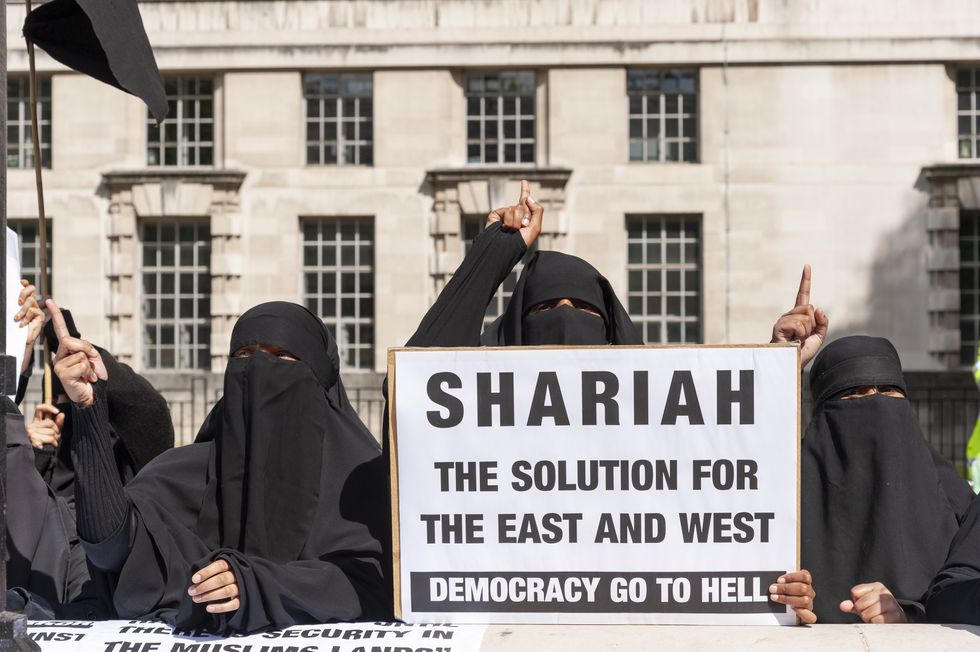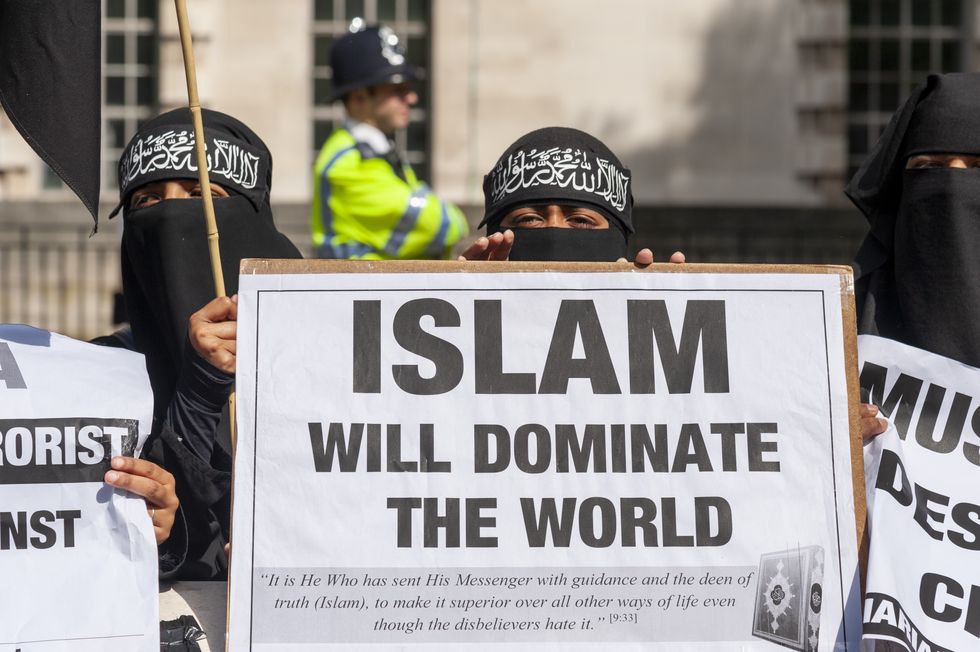Jack Walters
Guest Reporter
Sharia Councils “fail to respond appropriately to crimes they are aware of” and leave Muslim women at risk, a new report seen by GB News has revealed.
Think tank Pickthall House, which shared its findings with the People’s Channel, highlighted the scope of Sharia Councils in the UK.
Around 85 of these so-called councils operate in the UK, with the number potentially being even higher due to the failure to register them as either charities or businesses.
Sharia Councils, which carry no legal authority in the UK, operate merely as voluntary tribunals.

A majority of the cases dealt with include issues surrounding religious marriage, divorce and even financial disputes.
However, Pickthall House also stressed Sharia Councils “cannot address criminal cases” and are “not a parallel legal system”.
Dismissing the terminology of Sharia Courts, the think tank added that the right to seek arbitration of private disputes is a longstanding principle of British law under the 1996 Arbitration Act.
Despite its limited scope, Sharia Councils can exhibit jurisdictional overreach when it comes to child custody.
Pickthall House said: “There must be an enforceable statutory duty for Sharia
councils, and other religious voluntary arbitration services, to refer individuals to civil courts where children’s interests are at issue.”
Addressing concerns about the lack of transparency and risk of coercion, the think tank added: “Surveys suggest that, of the approximately two third of religiously married Muslim women whose marriages are not legally registered, nearly a third of these wrongly believe themselves to be legally married.
“Muslim leaders conducting religious marital ceremonies must inform prospective spouses of the fact that these weddings do not constitute legal marriage, and the implications of this for their legal rights and protections, to ensure that free and informed consent can be given.
LATEST DEVELOPMENTS:
“There is also anecdotal evidence of some Sharia councils failing to make individuals aware of their legal rights, notably by not providing ‘signposting’ to the appropriate legal guidance on marriage and divorce.
“To ensure all users of Sharia councils are freely agreeing to their
arbitration in full knowledge of the implications, councils should be required to advise users of their legal rights before they agree to arbitration.”
The report also highlighted fears about safeguarding policies to protect children and women from domestic violence.
“Due to the informal and unregistered nature of Sharia councils, it is impossible to know exactly how many cases of domestic violence come to light during proceedings, and what proportion of these are not reported to appropriate authorities,” the report added.
Pickthall House made a series of recommendations, including legislation forcing religious councils to register as charities and record decisions publicly.
The recommendations also called for a “safeguarding duty” to ensure crimes such as domestic violence are reported to “relevant legal authorities”.
The report raised particular concerns about a “disturbing pattern” emerging, particularly when it comes to domestic abuse.
Pickthall House warned: “It must be made absolutely clear to all providers and users of religious arbitration services like Sharia councils that domestic abuse and violence are never acceptable, and the state will never turn a blind eye to their occurrence in the name of ‘diversity’.”
Matters involving children should also be referred to the family justice system, Pickthall House added.
However, Pickthall House stopped short of calling for a Sharia Councils ban, warning it would conflict “with the traditional British commitment to religious freedom”.
There have been growing calls for a crackdown on so-called Sharia Councils.
A petition created in 2016 received 54,000 signatures and was later debated in Parliament.
The Government again dismissed the terminology of Sharia Courts, adding: “They cannot legally enforce any decision and must operate within the rule of national law. The Government has no plan to change this position.”
Ahead of the 2017 General Election, then-Ukip leader Paul Nuttall also called for a ban on so-called Sharia Courts.
The National Secular Society has also raised significant concerns about these parallel legal systems in Britain.
Stephen Evans, the society's chief executive, warned that these councils "undermine the principle of one law for all" and negatively impact women's and children's rights.
"It should be remembered that sharia councils only exist because Muslim women need them to obtain a religious divorce. Muslim men do not need them because they can unilaterally divorce their wife," Evans stated.

In its conclusion, the think tank said: “Britain has a long and proud tradition of protecting religious liberty as well as other personal
freedoms.
“Pickthall firmly believes there is no contradiction between these two values.
Sharia councils in Britain do not comprise a ‘parallel legal system’. There is only one legal framework, which is the same for citizens of all faiths and one.
“Within this framework, citizens may choose to refer to voluntary arbitration services, which may sometimes be religious in ethos, provided this is based in free and informed consent.
“Despite this, Pickthall is aware of a disturbing pattern in which basic norms of transparency and safeguarding are often not followed by Sharia councils.
“Exactly how common these failings are cannot be ascertained with certainty due to the informal nature of many Sharia councils.
“What can be said with certainty is that even one case of abuse or violence that is ignored, not to say legitimated, by a Sharia council is entirely unacceptable.
“Pickthall supports transparent, even-handed and proportionate regulation of Sharia councils on the same terms as other religious arbitration services.
“This regulation must be guided neither by hostility to faith, nor by blind respect for ‘diverse’ cultural practices, but by commitment to the liberties of British citizens and to protecting the rights and interests of vulnerable women and children.”
Find Out More...
Think tank Pickthall House, which shared its findings with the People’s Channel, highlighted the scope of Sharia Councils in the UK.
Around 85 of these so-called councils operate in the UK, with the number potentially being even higher due to the failure to register them as either charities or businesses.
Sharia Councils, which carry no legal authority in the UK, operate merely as voluntary tribunals.

A majority of the cases dealt with include issues surrounding religious marriage, divorce and even financial disputes.
However, Pickthall House also stressed Sharia Councils “cannot address criminal cases” and are “not a parallel legal system”.
Dismissing the terminology of Sharia Courts, the think tank added that the right to seek arbitration of private disputes is a longstanding principle of British law under the 1996 Arbitration Act.
Despite its limited scope, Sharia Councils can exhibit jurisdictional overreach when it comes to child custody.
Pickthall House said: “There must be an enforceable statutory duty for Sharia
councils, and other religious voluntary arbitration services, to refer individuals to civil courts where children’s interests are at issue.”
Addressing concerns about the lack of transparency and risk of coercion, the think tank added: “Surveys suggest that, of the approximately two third of religiously married Muslim women whose marriages are not legally registered, nearly a third of these wrongly believe themselves to be legally married.
“Muslim leaders conducting religious marital ceremonies must inform prospective spouses of the fact that these weddings do not constitute legal marriage, and the implications of this for their legal rights and protections, to ensure that free and informed consent can be given.
LATEST DEVELOPMENTS:
- Grooming gangs scandal 'cover up' is motivated by 'money and political power', Reid claims
- 'Vile and sickening!' Neighbour accuses pub-goers of mocking mum's death and cutting off CCTV
- Martin Daubney moved to tears by grooming gangs scandal as whistleblower details horrific cases
“There is also anecdotal evidence of some Sharia councils failing to make individuals aware of their legal rights, notably by not providing ‘signposting’ to the appropriate legal guidance on marriage and divorce.
“To ensure all users of Sharia councils are freely agreeing to their
arbitration in full knowledge of the implications, councils should be required to advise users of their legal rights before they agree to arbitration.”
The report also highlighted fears about safeguarding policies to protect children and women from domestic violence.
“Due to the informal and unregistered nature of Sharia councils, it is impossible to know exactly how many cases of domestic violence come to light during proceedings, and what proportion of these are not reported to appropriate authorities,” the report added.
Pickthall House made a series of recommendations, including legislation forcing religious councils to register as charities and record decisions publicly.
The recommendations also called for a “safeguarding duty” to ensure crimes such as domestic violence are reported to “relevant legal authorities”.
The report raised particular concerns about a “disturbing pattern” emerging, particularly when it comes to domestic abuse.
Pickthall House warned: “It must be made absolutely clear to all providers and users of religious arbitration services like Sharia councils that domestic abuse and violence are never acceptable, and the state will never turn a blind eye to their occurrence in the name of ‘diversity’.”
Matters involving children should also be referred to the family justice system, Pickthall House added.
However, Pickthall House stopped short of calling for a Sharia Councils ban, warning it would conflict “with the traditional British commitment to religious freedom”.
There have been growing calls for a crackdown on so-called Sharia Councils.
A petition created in 2016 received 54,000 signatures and was later debated in Parliament.
The Government again dismissed the terminology of Sharia Courts, adding: “They cannot legally enforce any decision and must operate within the rule of national law. The Government has no plan to change this position.”
Ahead of the 2017 General Election, then-Ukip leader Paul Nuttall also called for a ban on so-called Sharia Courts.
The National Secular Society has also raised significant concerns about these parallel legal systems in Britain.
Stephen Evans, the society's chief executive, warned that these councils "undermine the principle of one law for all" and negatively impact women's and children's rights.
"It should be remembered that sharia councils only exist because Muslim women need them to obtain a religious divorce. Muslim men do not need them because they can unilaterally divorce their wife," Evans stated.

In its conclusion, the think tank said: “Britain has a long and proud tradition of protecting religious liberty as well as other personal
freedoms.
“Pickthall firmly believes there is no contradiction between these two values.
Sharia councils in Britain do not comprise a ‘parallel legal system’. There is only one legal framework, which is the same for citizens of all faiths and one.
“Within this framework, citizens may choose to refer to voluntary arbitration services, which may sometimes be religious in ethos, provided this is based in free and informed consent.
“Despite this, Pickthall is aware of a disturbing pattern in which basic norms of transparency and safeguarding are often not followed by Sharia councils.
“Exactly how common these failings are cannot be ascertained with certainty due to the informal nature of many Sharia councils.
“What can be said with certainty is that even one case of abuse or violence that is ignored, not to say legitimated, by a Sharia council is entirely unacceptable.
“Pickthall supports transparent, even-handed and proportionate regulation of Sharia councils on the same terms as other religious arbitration services.
“This regulation must be guided neither by hostility to faith, nor by blind respect for ‘diverse’ cultural practices, but by commitment to the liberties of British citizens and to protecting the rights and interests of vulnerable women and children.”
Find Out More...
